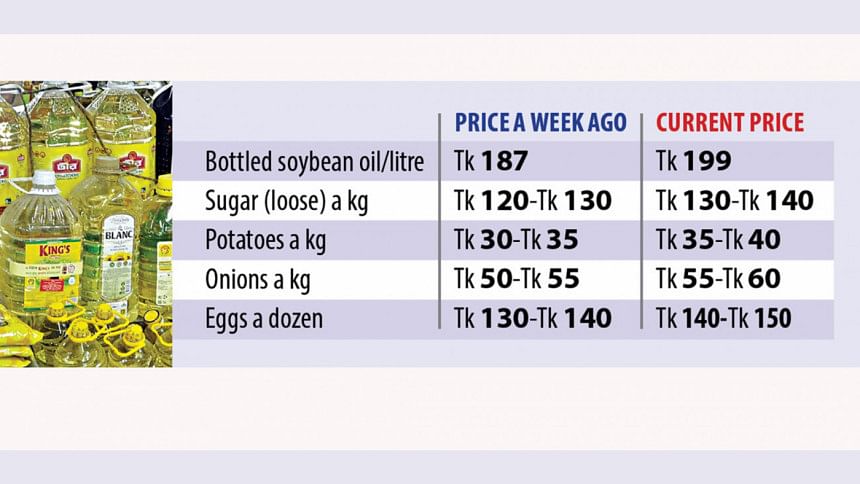No let-up in price hike

When people are already struggling to cope with high prices of daily essentials, a fresh hike in the prices of soybean oil, sugar, onions, and potatoes has dealt them a further blow.
This will only force them to dig deeper into their pockets at a time when inflation is close to double digits.
Crude soybean oil refiners on Wednesday raised the price of one-litre bottled soybean oil by Tk 12 to Tk 199 while the price of loose soybean oil was increased by Tk 9 to Tk 176 a litre. A consumer has to pay Tk 960 for a five-litre jerrycan, which was Tk 906.
Bangladesh Vegetable Oil Refiners' and Vanaspati Manufacturers' Association hiked the prices after consulting with the commerce ministry and the Bangladesh Trade and Tariff Commission.
A commerce ministry official said the VAT on edible oil was reduced to 5 percent from 15 last year in the face of soaring prices of the cooking oil. The benefit expired on April 30 and the VAT is back to 15 percent.
As the prices of edible oil are dropping in the international market, the government did not extend the facility, he said.
On the other hand, retail price of sugar rose in the capital over a week. A kg of loose sugar is currently being sold for Tk 130-Tk 140, which was Tk 120-Tk 130.
On April 8, the government set the price of loose sugar to Tk 104 and Tk 109 for a kg of packaged sugar.
Prices of potatoes and onions have gone up by Tk 5 a kg over a week, putting consumers, especially those of limited-income, in further difficulty.
A kg of potatoes is now being sold at Tk 30 to Tk 35 while onions cost Tk 55 to Tk 60 a kg.
The retail price of eggs also rose by Tk 10 a dozen. A dozen is now Tk 140-Tk 150.
"The prices of almost all essential commodities have been increasing, but not our income. How could we survive in this situation?" Sukkur Ali of West Tejturibazar told The Daily Star yesterday.
He said he is left with no other option but to cut consumption as the fresh hike will only spell more trouble for his family.
"I'm thinking of not providing my children and elderly mother with eggs every day as I cannot afford it after paying the rent and other fixed expenses."
Anamul Haque, who works at a private bank in Chattogram, said they have already cut consumption of desserts like payesh and shemai because of the high prices of sugar.
"Now I may have to consume these desserts once a month instead of once a week," he said, adding that he was expecting a relief from price hike after Eid, but that did not happen.
Visiting different kitchen markets in the capital yesterday, this correspondent saw traders selling a kg of loose sugar for Tk 130-Tk 140. Last week, its price was Tk 120 to Tk 130, according to the traders.
Tofail Ahmed, proprietor of Al-Amin Store in Karwan Bazar, said he usually stores sugar after buying it from Moulvibazar wholesale market in Old Dhaka.
He said suppliers at the wholesale market told him that there has been a shortage in supply for about a month.
Tofail said last week he bought packaged sugar for Tk 125 a kg although the retail price mentioned in the packets is Tk 109. He added that he sold a one-kilogram packet of sugar for Tk 130.
According to the National Board of Revenue, sugar imports dropped by about 25 percent, or 2.29 lakh tonnes, in the first four months of the year compared to the same period of 2022.
The country's annual demand for sugar is 25 lakh tonnes. But domestic production can supply only 1 lakh tonnes.
Md Gofran, proprietor of Cumilla General Store in Karwan Bazar, said he tried to buy a few cartons (four 5-litre jerrycans) of soybean oil for his regular customers after hearing about its possible price hike on Wednesday afternoon.
But he could not as the distributors told him that the commodity was unavailable, he said.
He, however, could buy a few cartons at a higher price. He added that a carton cost Tk 3,560, which was Tk 3,480 on Wednesday.
Ghulam Rahman, president of Consumers Association of Bangladesh, said hiking price of soybean oil by Tk 12 a litre is not logical.
"The price of soybean oil has considerably declined in the international market. Although the government has withdrawn VAT privilege considering the price drop in the international market, the oil price should not have increased this much."
The refiners are making extra profits giving the VAT withdrawal as an excuse. Some big companies are controlling the market in the absence of strict monitoring by the government, Ghulam said.

 For all latest news, follow The Daily Star's Google News channel.
For all latest news, follow The Daily Star's Google News channel. 



Comments